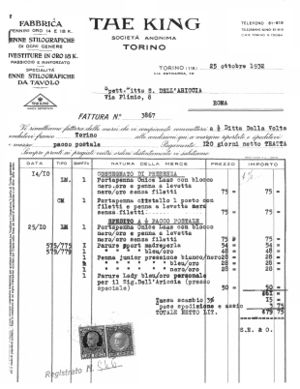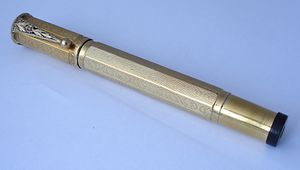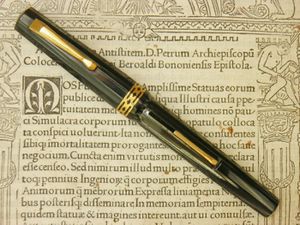Società Anonima Fabbrica Italiana Stilografiche
The SAFIS origins have not been very clear for a long time and its place in the market with various brand names that refer to this company has been uncertain. But recent findings have found documentary references that a company with the name Società Anonima Pennini King, holder of the The King trademark was founded in Turin, June 23, 1926, and further evidence shows that it was later forced to change its name in Società Anonima Fabbrica Italiana Stilografiche, probably as a result of the policy of names Italianisation imposed by the fascist regime.
The company is one of the best Italian fountain pens manufacturers, with models with anything to envy in terms of quality of workmanship and beauty of celluloid, to those produced by other first tier brands. The initial production was made under the The King brand, which was partially maintained in the following years, when the company, after the name change, produced its fountain pens under a variety of different trademark, among which Radius and Astura. The company had its best period between the 30s and 40s and ceased production in the late 50s, (but an exact date is not known).
| SAFIS |
|---|
| Brand pages |
| Brand advertising |
| Brand photos |
| Instructions sheet |
| Other documents |
History
The SAFIS origins have been unclear for long time. It was generally referred that SAFIS (which stands for "Società Anonima Fabbrica Italiana Stilografiche") was established by a not better known Mr. Lattes in Turin, remaining active between 30s and 50s in Via Ormea. Recent findings in the Chamber of Commerce records reported that the company was founded in Turin June 23, 1926, under the name "Società Anonima Pennini King". The The King trademark was then registered by the same November, 8 1926 (see File:The-King-Trademark.pdf). It is not know for sure when the name change to SAFIS took place.

Another recorded information is the name of the company as "The King Società Anonima Torino" noted on the recently found invoice reported by side, which testifies to its continuing at least until 1932, although the seat, Via Petrarca 10,[1] is not the same quoted above, although a few blocks away. The same name appears in a catalog of this company ("Società Anonima The King Torino") found at OMAS archives. [2] An upper limit on the other hand is the 1934, for which there is registration of the Radius trademarks (Reg. Gen. N. 50489) by "S.A.F.I.S. Soc. An. Fabbrica Italiana Stilografiche".
Today you can say without a doubt that the origin of the brand is the one that leads back to the The King production and next to SAFIS. This was already what appeared to be from some oral testimony,[3] where the transition would take place with the enactment of laws for the Italianisation of names promulgated by the fascist regime. In fact, the Radius brand (Reg. Gen. N. 50489) was deposited in 1934, which we take as the year of SAFIS rise.
Although there are no known specific traces of the passage, nor for the registration of the new "Società Anonima Fabbrica Italiana Stilografiche" name, the ultimate proof of the coincidence of the two companies is obtained from the discovery of the "The King Superior" trademark registrastion (Reg. Gen. N. 38982) in 1928 by "Soc. Anonima Fabbrica Pennini King" and the renewal in 1946, with explicit reference to the previous record, on behalf of "Soc. An. Fabbrica Italiana Stilografiche". For a long time one of the assumptions made about the origins of the brand The King had been to regard it as a production commissioned by the OMAS because of the similarity of some production, and the fact that the brand is mentioned as part of the products made by the commission OMAS in the text "Stilografiche Omas dal 1925 ad oggi" published by the "Club Internazionale della Stilogragrafica A. Simoni".

The initial production marked The King consisted of excellent quality hard rubber safeties marked The King Superior, they were pens made in the Waterman 42 style but with beautiful engraved clips. From the same period is also the production of overlay pens engraved with the mark on the edge of the cap, like the one shown in the image on the left. This initial production features original characters and cannot be attributed to the OMAS production. It's also known a production of lever filler models.
A link with OMAS is certainly evidenced by the "penna del dottore" marked The King shown in the side picture. It's possible, therefore, that some models, like the one shown, were produced to order and then rebranded. So it we have clear traces (as we shall see below) that link The King to OMAS is still totally unreliable the opposite hypothesis that would have been the The King/SAFIS to produce OMAS pens, since the company's foundation is later.
The later production were flat top models that as much of the Italian production of the time turn out to be clear imitations of the Parker Duofold. These models are still branded as The King Superior and produced in two sizes and five colors. Unlike Duofold there pens were equipped with an original twist filling system[4] which can be accessed by unscrewing the cap anyway. During this period the top model is the The King Diamond, featuring a cap with countersunk head decorated with a greek band.
This patent is a second point that bears witness of the presence, at least in early years, of a strong link with OMAS. The image of the filling mechanism used by these patented pens, present on the The King catalog found in the Omas archives and on this advertisement, is in fact identical to the one on an Armando Simoni patent (nº US-1784078), that in the French version appears to have been achieved in Italy in 1929. A further indication that somehow it was the OMAS to provide technology to the The King in the early years of this company. Around 1934 "The King Società Anonima Torino" was renamed in "Società Anonima Fabbrica Italiana Stilografiche", because of the policies of forced Italianisation of names carried out by the fascist regime, which made it unattractive to use an English name. It is not known when the first pens Radius appeared on the market, and at the moment the only certain date is that of the trade mark registration (Reg. Gen. N. 50489) which occurred in 1934 by the new company, which is why we take this year as its starting date.
The Radius initial production was divided in two lines: the Superior for the more valuable high-end pens and more valuable, and the Extra for second tier pens sold at lower prices. The Superior line remained in production, with different stylistic and technical changes, including the implementation of Trasparente version, until the '50s, while the Extra line was decommissioned in the late '40s, replaced by other economic production, such as the Comet and the Radius 31, hooded nib models of much lower quality than its predecessors.
In the '50s in fact (at least so it appears in this catalog) the Superior line, which in the meantime had taken on ogival lines following the stylistic trends of the period, was flanked by cheaper models such as the Comet (with a winged nib very similar to that of the Montblanc 25x) and the Radius 31, a model with hooded nib of much lower quality than its predecessors. In the same catalog we note the presence of an additional model, the Fortune 38, a clear imitation of the Pelikan 400. After WWII the restrictions imposed by the fascist regime ended and the brand The King was taken up by the SAFIS, and re-entered the market with the production of quality fountain pens, substantially equivalent to the simultaneous production of Radius brand, but did not reach the level of excellence achieved over the initials years. Postwar SAFIS activities seem to end in the second half of 50s, when the company was probably put out of business by the spread of disposable ballpoint pens. But there are no reliable documents about the cessation of the activity, the date of which is not precisely known.
Chronology
| Year | Event |
|---|---|
| 1926 | Società Anonima Pennini King (The King), that will become SAFIS, is founded in Turin |
| 1934 | Società Anonima Pennini King (The King) becomes Società Anonima Fabbrica Italiana Stilografiche (SAFIS) (guess date[5]) |
| 1934 | SAFIS register the Radius trademark (Reg. Gen. N. 50489) |
| 1935 | the company introduces the Radius Extra (guess date, stands for the mid '30s) |
| 1936 | SAFIS register the Astura trademark (Reg. Gen. N. 54056) |
| 1941 | the company introduces the Radius Extra Trasparente (guess date, stands for the beginning of '40s) |
| 1941 | the company introduces the Radius Superior Trasparente (guess date, stands for the beginning of '40s) |
External references
- http://www.pentrace.net/article112900028.html
- http://web.archive.org/web/20050125011331/http://www.fortunecity.it/lunapark/eventi/71/w12.html
- http://web.archive.org/web/20011122230744/http://www.fortunecity.it/lunapark/eventi/71/w13.html
Notes
- ↑ this address is also in the annals of the Politecnico di Torino 1936, as reported by Letizia Jacopini in his book "La storia della stilografica in Italia".
- ↑ as also reported by Letizia Jacopini in his book "La storia della stilografica in Italia".
- ↑ again reference to Letizia Jacopini book "La storia della stilografica in Italia" that reports how Bruno Milocani and Emilio Pionzo witness the production shift from The King to Radius name in 1935 caused by the forced Italianisation policies of the fascist regime.
- ↑ Letizia Jacopini reports in her book the n° 268827, but that's too similar to Columbus nº IT-268327 and on a sample (see this photo) there is imprinted the nº IT-4572-1929.
- ↑ refers to application for the Radius trademark, done with this name.


